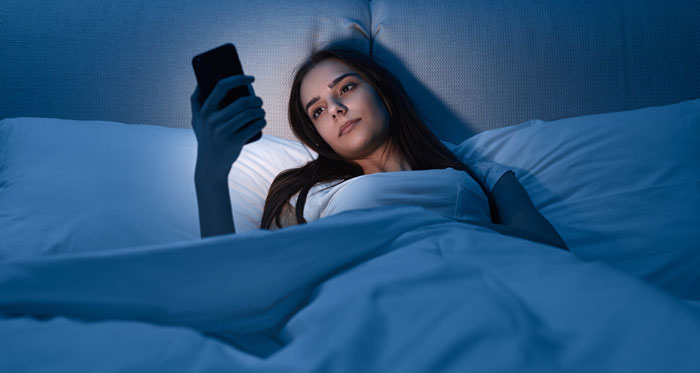Let’s be real — these days, it feels like our phones, laptops, and tablets are just glued to our hands. Whether it’s for work, scrolling through Instagram, or binge-watching shows, we spend hours staring at screens. But here’s something you probably haven’t thought much about: all that screen time could actually be affecting your skin.
We all know about sun damage and pollution, right? But now there’s a new player in town—blue light. It’s coming from your devices, and it might be quietly speeding up how fast your skin shows signs of aging. Sounds scary, but don’t worry, I’ll break down what it is, why it matters, and how you can protect your skin without giving up your screen time.
What’s Blue Light Anyway?
Blue light is part of the light we can see — it’s the same light that comes from the sun and makes the sky look blue. But these days, we’re mostly talking about the blue light that comes from our screens — phones, computers, tablets, even LED bulbs.
It’s not as harmful as UV rays from the sun, but because we’re exposed to it so much (hello, 8+ hours on your laptop!), it can still cause trouble for your skin.
How Blue Light Messes With Your Skin

1. It Goes Deeper Than You Think
UV rays mainly bother the surface of your skin, but blue light actually sneaks deeper down into the second layer — where collagen and elastin live. These are the things that keep your skin bouncy and smooth. Blue light creates stress inside your skin cells, breaking down these important proteins. That means more wrinkles and sagging sooner than you’d like.
2. It Can Cause Dark Spots
If you’ve noticed uneven skin tone or those annoying dark patches, blue light might be playing a role. It boosts melanin production, which leads to pigmentation. People with darker skin tones might see this more clearly, but it’s something everyone should watch out for.
3. It Can Make Your Skin Red and Inflamed
If your skin is sensitive or prone to redness (like rosacea), blue light can stir that up. It might not show right away, but over time, it can make your skin more irritated and fragile. And that’s a fast track to aging.
4. It Messes With Your Skin’s Nighttime Repair
Your skin does most of its healing when you’re asleep. But if you’re scrolling your phone late at night, that blue light can mess with your skin’s natural repair schedule. The result? Dullness, dryness, and an overall tired look.
What’s This “Digital Aging” Everyone’s Talking About?

You might have heard the phrase “digital aging” floating around. It basically means your skin is aging faster because of all the screen time and blue light you’re exposed to daily. It’s similar to how sun damage causes premature aging, just less obvious and a bit sneaky.
Sure, blue light isn’t the only thing speeding up wrinkles and dark spots — pollution, stress, and bad skincare habits are part of it too. But blue light is definitely a key player.
So, How Do You Protect Your Skin From Blue Light?

No need to freak out or throw your phone away. Here’s what you can do:
1. Employ Blue Light Filters
Just about every phone and computer has a setting for this — “night mode” or “blue light filter.” Turn it on, particularly at night. It dims the harsh blue light and gives your skin (and eyes!) a rest.
2. Incorporate Antioxidants into Your Routine
Imagine antioxidants as bodyguards for your skin cells. Vitamin C, niacinamide, and green tea are such excellent examples. They assist in combating the damage caused by blue light. Indulgeo Essentials 15% Vitamin C Essence is a great product to use for this.
3. Keep Your Skin Hydrated
Blue light dries out your skin, so moisturizing is essential. Try creams or gels containing hyaluronic acid and ceramides — they trap moisture and fortify your skin. I find Indulgeo’s Aqua 24k Gold Premium Moisture Gel great for this.
4. Don’t Miss Sunscreen
Even inside, sunscreen is your best buddy. A lot of sunscreens these days screen out UV and blue light, so choose one with an SPF 30 or higher and apply it daily.
5. Take Breaks From Screens
The 20-20-20 rule saves the day here: once every 20 minutes, shift your gaze to something 20 feet away for a minimum of 20 seconds. It relaxes your eyes and decreases your skin’s exposure to blue light. Bonus: it’s also a great reason to stretch and get up!
Wrapping It Up
We can’t really survive without screens — and believe me, who needs that? But understanding how blue light works on your skin makes you a smarter caretaker of yourself.
With a few easy habits — filters, antioxidants, moisturizer, sunscreen, and screen time-outs — you can maintain glowing, fresh-looking skin regardless of how many hours you’re online.
So go ahead, binge-watch that show or complete that work project. Just bear in mind: a little extra TLC goes a long way in keeping your skin happy in this virtual world.
Also Read : Why Sunscreen Is Essential for Aging Prevention: Protect & Preserve Your Skin!



